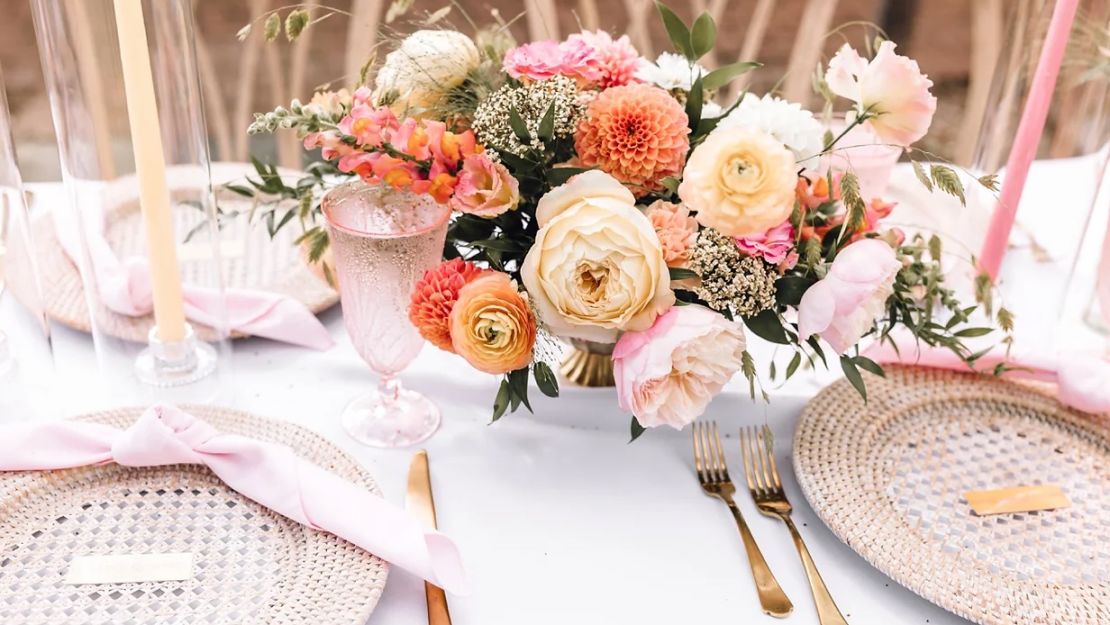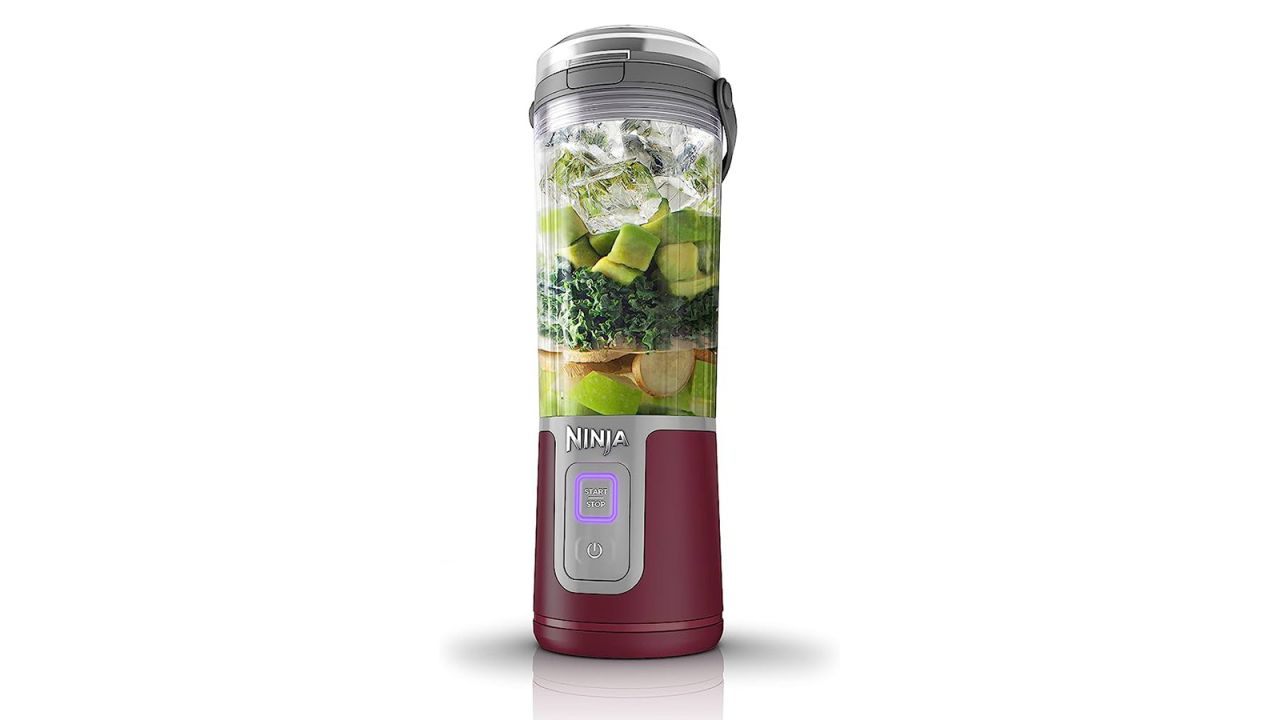Sustainable wedding quick picks
Rent silk flowers: Something Borrowed Blooms
Use compostable cutlery: Eco Soul Compostable Cutlery, 350-Pack
Rent your outfits: Rent the Runway
Between all the food waste, single-use decor and florals that wilt within a couple of days, you might be wondering how to plan a sustainable wedding. To help you figure it out — while still pulling out all the stops for your wedding day, of course — we asked wedding planners and sustainability experts for tips on how to reduce your special day’s waste and impact.
Source your goods locally to reduce your carbon footprint
According to Dana Watts, a sustainable wedding planner and owner of Thyme and Details, a wedding’s overall carbon footprint from “transportation of flowers, tens to hundreds of guests flying in for a quick event, shipment of invitations and single-use decorations” is what makes it a burden on the environment. To put that into perspective, the Environmental Protection Agency Greenhouse Gas Equivalencies Calculator found the average wedding in the US emits 62 tons of carbon dioxide, which is equivalent to burning 65,000 pounds of coal, according to climate change education organization TerraPass.
Luckily, there’s lots you can do to ensure you limit your wedding’s environmental impact. Imogen Stuckes, founder of sustainable wedding florist Flowers by Imogen, recommends sourcing your wedding flowers locally. “Ask your florist if they could possibly buy flowers from local flower farms,” she says. “Eighty percent of flowers are imported in the US, flown over from across the world, treated with toxic chemicals and who knows if they’re ethically grown too.” She adds that it’s also a good idea to check if your florist uses sustainable production mechanisms and works without the use of foam. “Floral foam is a frequently used way of keeping flowers fresh but it’s made from toxic chemicals including formaldehyde,” she says.

Have a locally sourced cocktail hour and dinner menus
Food is arguably one of the most crucial aspects of your wedding day. After all, your guests need fuel for the dance floor. But all the animal-based meals aren’t doing any favors for the planet. Large bodies of research, including a recent study from the scientific journal Frontiers in Sustainability, found that animal-based agriculture is one of the leading drivers in greenhouse gas emissions, deforestation and nonrenewable energy use, to name a few. As an antidote, Hooman Bahrani, wedding photographer and founder of Wedding Day Timeline, says he’s noticed an uptick in wedding menus that now include “locally grown and in-season offerings as well as more vegetarian and plant-based foods, especially during cocktail hour as well as buffet dinner options.” In this vein, Watts says you’ll want to stick to plated meals in lieu of buffets. “They can be just slightly more costly due to labor, but food costs are less,” she says. “Plus, the service is a nice touch and significantly reduces waste while improving the ability to donate any leftovers.”
Limit single-use decor
Instead of getting your wedding Instagram-ready by investing in all-new decor, be a little resourceful. Watts recommends making creative use of what your event space already has in order to limit single-use decor purchases. If you must invest in new items, she recommends working with a local decor rental company to upgrade the space “before buying decorations that will just sit in your garage for five to 10 years after the wedding.” Then, you can always repurpose said decor between the ceremony and the reception. For extra sustainability points, look for a venue that operates as a nonprofit, since Watts says they “offer greater value to society and exist 24/7/365, not solely for events on the weekends.”
Donate leftover food and decor
If you’ve purchased a wedding item, be sure to donate it to another couple or sell it on a resale marketplace like Facebook Marketplace or Depop. “The potential to save a lot of cash, the [growing] acceptance of giving and receiving pre-owned items and the sustainable benefits of resale are attractive to shoppers,” Ken Murphy, senior vice president of product at resale platform OfferUp, says. “That can be particularly true when looking to spend on big and often costly events like weddings.” He recommends leaning into the way resale can help enhance your creativity when it comes to wedding planning. “One of the fun parts of planning events like weddings is the ability to get creative and personalize the experience,” he says. “By shopping resale, you can paint or refurbish pieces or mix and match styles.”
If you’re worried about extra food going to waste, you may be able to work with your caterer to donate any leftovers to local facilities such as homeless shelters. Just be sure to ask the catering company you work with and research local laws and regulations as you may need proper approval.
Use biodegradable paper goods
Another big source of waste at weddings is all the trash. Luckily, there are plenty of biodegradable paper goods you can substitute for plastic ones. Whether it’s for cutlery, napkins, plates or cups, if there’s a biodegradable option you should try to use that instead. An even better option is using compostable replacements. “Consider compostable and not just biodegradable cups and single-use disposables,” Watts says. “It’s important to follow through if you’re going to buy compostable products by confirming with your caterer, venue and planner how and where your compostable materials will be composted.”
Wear sustainably sourced bridal, bridesmaid and groomswear attire
Buying secondhand wedding attire may sound tacky, but limiting the number of new things you purchase is always a good idea when it comes to sustainability. If you don’t want to buy used clothes, you could also rent your wardrobe, which is not only more sustainable than buying a dress you’ll wear once but also potentially money-saving.
Sustainable wedding tips
Sustainability can understandably feel like this big, nebulous concept that’s hard to quantify, so if you’re looking for a tangible way to determine your wedding’s carbon footprint, use this wedding footprint calculator to input your unique stats, from event location to number of guests and vendors.
When possible, Watts says to choose local for all elements of your wedding, from the food to spirits to wedding gifts, invitations, outfits, jewels and more. While our experts agree renting, repurposing and limiting your use of new items is ideal, shopping for certain wedding elements is unavoidable. Here, the best sustainable wedding essentials to shop for your perfect day.

































